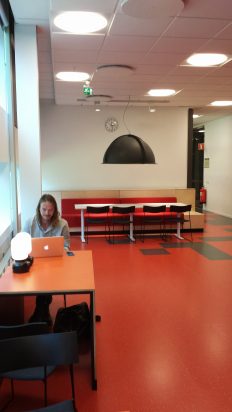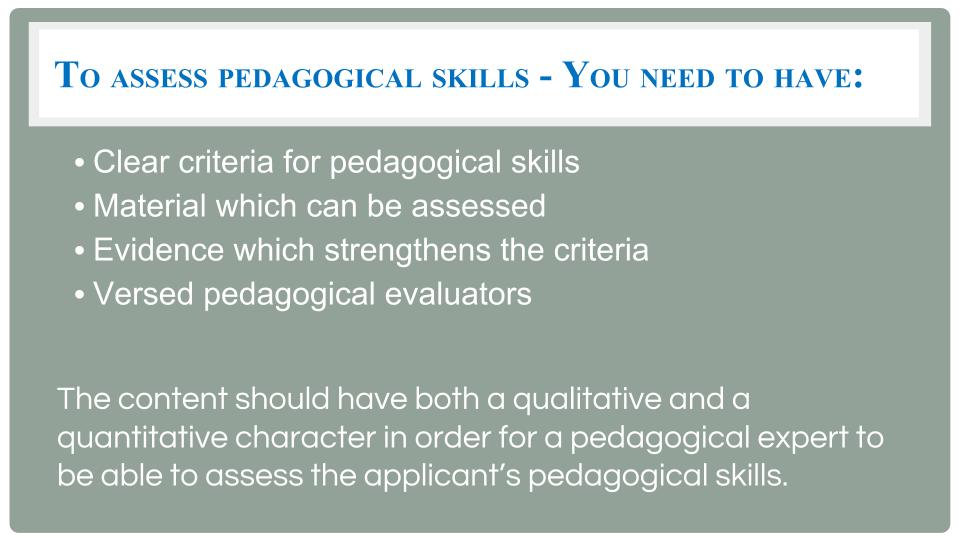The foundation
The Association of Swedish Higher Education – Recommendations on general learning outcomes for the teaching qualifications required for employment as academic teacher (2016).
The participant shall demonstrate the ability to:
- discuss and problematise student learning in the participant’s own subject area, on the basis of research in educational sciences and/or subject didactics of relevance for teaching in HE
- independently and jointly with others, plan, implement and evaluate teaching and assessment in higher education with a scientific, scholarly or artistic basis and within their own area of knowledge
- make use of, and assist in the development of, physical and digital learning environments to promote learning for groups and for individuals
- interact with students in an inclusive manner and demonstrate knowledge of rules and regulations regarding students with disabilities and of available student support
- apply relevant national and local rules and regulations, and to discuss society’s objectives for HE and the academic teaching role in terms of the participant’s own practice and students’ active participation in HE
- reflect on their professional approach to academic teaching and their relationship with the students, and also towards the fundamental values of higher education, such as democracy, internationalisation, gender equality, equal opportunities and sustainability
- collect, analyse and communicate their own and others’ experiences of teaching and learning practices, and relevant outcomes of research, as a basis for the development of educational practice and of the academic profession.
The participants must have started a teaching portfolio.
Comment: Reflect over what knowledge and skills you have in relation to the goal above.

In general about pedagogical proficiency
The overall purpose of a teaching portfolio is to present your pedagogical merits in as fair, clear and advantageous way possible. It is your pedagogical proficiency that is judged from the documentation. Today there are expressed eligibility requirements for demonstrated pedagogical proficiency in order to be employed as a teacher at a university under both the Higher Education Act and the Higher Education Ordinance in Sweden.
In the Higher Education Ordinance we read:
”Equal care should be given to the examination of pedagogical proficiency as is given to scientific proficiency.” HF (1998:1003)
At certain universities, this is becoming more and more important and pedagogical experts are hired to a much greater extent. The basis for assessment is in the teaching portfolio. With it, you have the possibility to be judged according to the quality of your pedagogical work. Competence lies primarily in how the teacher conducts his/her pedagogical work with regard to the questions What?, How?, Why?, and Results and vision. This applies to the teacher’s own pedagogical development, the development of the teaching as well as professional development. A traditional quantitative CV is not good enough for this kind of assessment.
Read:
- Ashwin, P. & Trigwell, K. (2004). Investigating staff and educational development. In Baume, D. and Kahn, P.: Enhancing Staff and educational development. Pp. 117-132 Routledge Falmer.
- Broughan, C., Steventon, G., & Clouder, L. (Eds.). (2018). Global Perspectives on Teaching Excellence: A new era for higher education. Routledge.
- Kreber, C. (2002). Teaching excellence, teaching expertise and the scholarship of teaching. Innovative higher education, 27: 5 – 23.
- Skelton, A. (2009). A teaching excellence for the times we live in? Teaching in Higher Education. Vol. 14, No. 1.
- Trigwell, K., E. Martin, et al. (2000). Scholarship of Teaching: a model. Higher Education Research and Development 19(2).
PEDAGOGICAL QUALIFICATION MODELS
At more than half of Sweden’s higher education institutions (such as Lund University, Uppsala University, the Lund University of Technology, University of Gothenburg, and Umeå University), pedagogical meriting is used, a form of pedagogical career ladder to reward educational work and enhance the quality of teaching.
University teachers apply to have their pedagogical ability assessed in able to be promoted to more highly qualified or excellent teachers. At Lund and Umeå for example, placement on the pedagogical merit ladder is linked with an individual salary increase and Lund University assigns money to the department as well. All in order to increase the pedagogical competence at the university. Teachers who put time and effort into developing their teaching should be rewarded.
In Swedish:
- Winka, K. (2017). Kartläggning av pedagogiska meriteringsmodeller vid Sveriges högskolor och universitet. PIL-rapport 2017:02.
- Rovio-Johansson, A. (2001). Pedagogisk skicklighet och pedagogiska meriter – historik och praktik . Stockholm. Högskoleverket.
- Winka, K. & Ryegård, Å. (2019). Pedagogisk portfölj: för karriär och utveckling. (2 uppl.) Studentlitteratur AB.
In English – examples of pedagogical qualification models:
ASSESSMENT OF PEDAGOGICAL SKILLS
One can assess pedagogical skills, just as one can judge scientific ability. Certain higher-learning institutions have come a long way and place increasing importance on pedagogical skills.
In Swedish:
- Chalmers – Pedagogisk skicklighet
- Ryegård Å, Apelgren K & Olsson T (eds) (2010). A Swedish Perspective on Pedgogical Competence. Division for Development of Teaching and Learning, Uppsala University
- Stockfors, J. (2011). Att visa och bedöma pedagogisk skicklighet. Enheten för Pedagogisk rapport 1 från Universitetspedagogiskt centrum, SLU.


